高中英语语法---情态动词和虚拟语气课件(65张ppt)
文档属性
| 名称 | 高中英语语法---情态动词和虚拟语气课件(65张ppt) |  | |
| 格式 | zip | ||
| 文件大小 | 1.5MB | ||
| 资源类型 | 教案 | ||
| 版本资源 | 通用版 | ||
| 科目 | 英语 | ||
| 更新时间 | 2022-08-08 16:01:19 | ||
图片预览


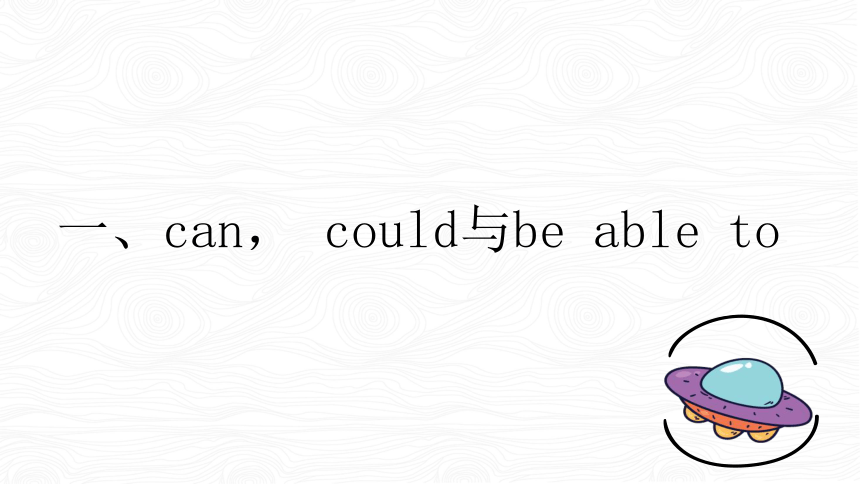
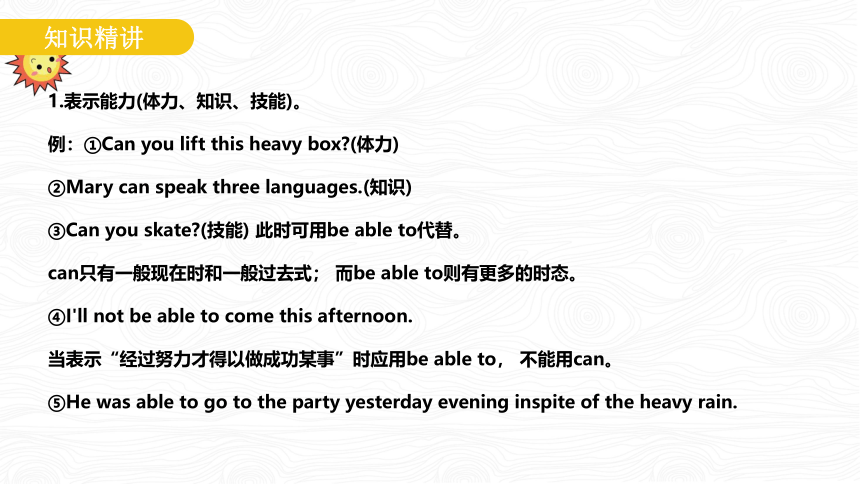
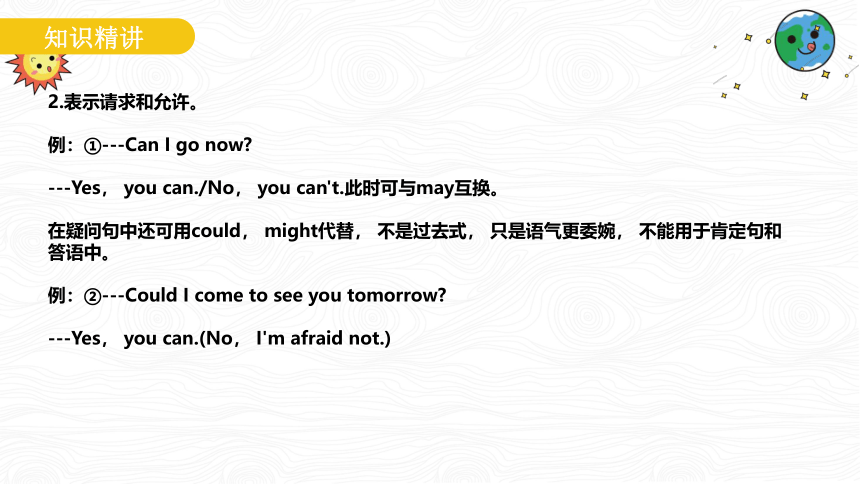
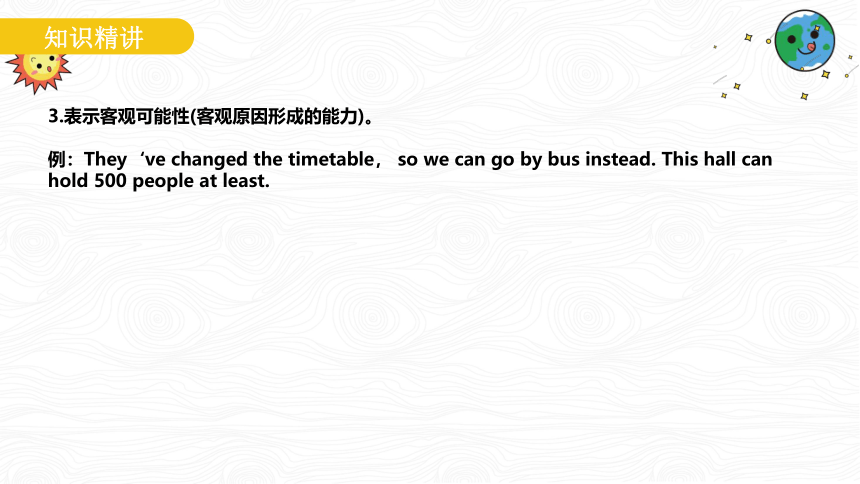

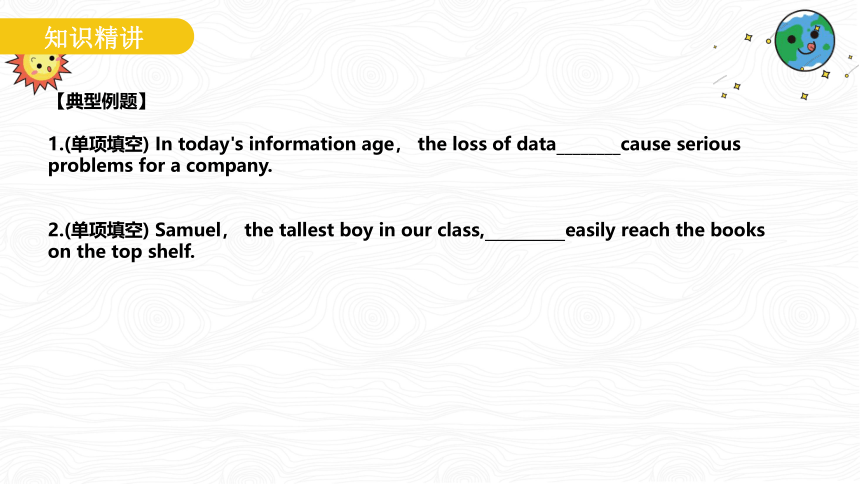
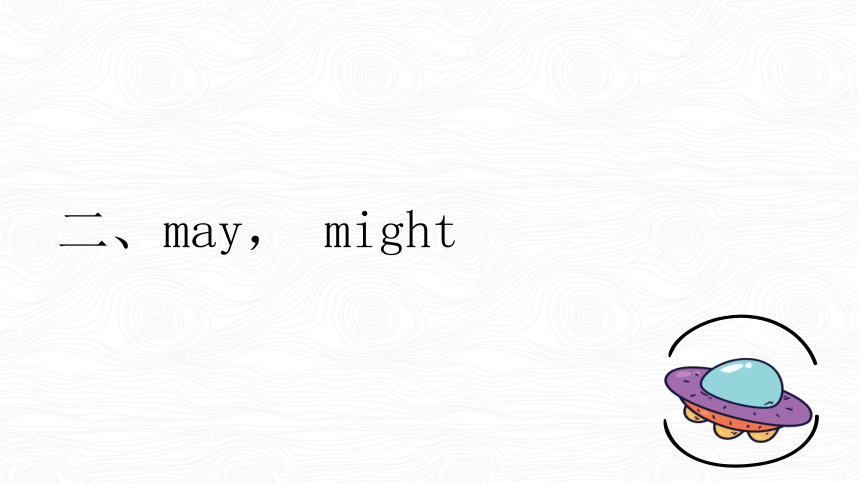
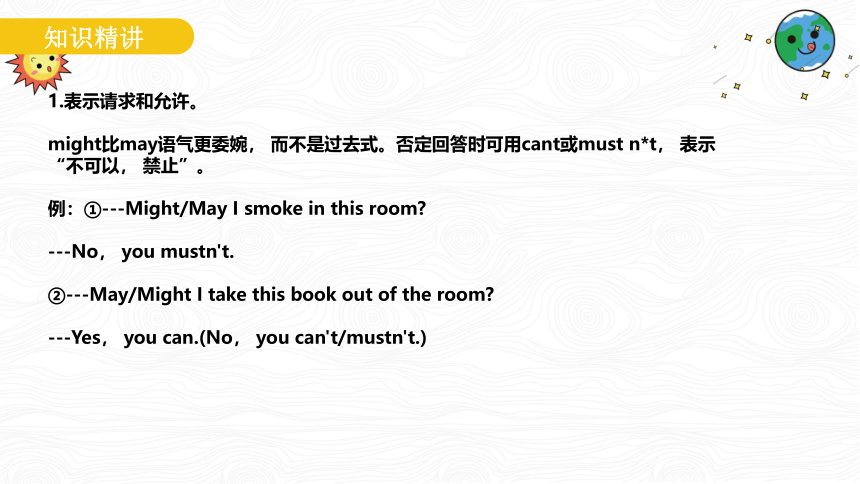

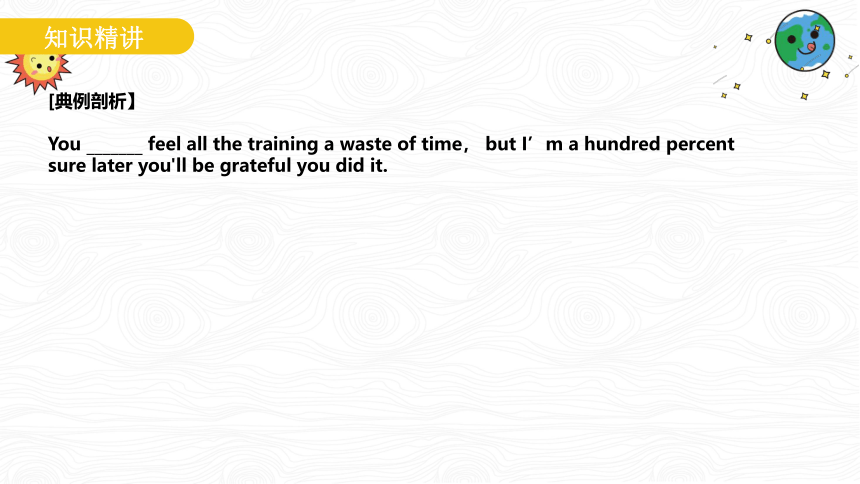
文档简介
(共65张PPT)
情态动词和虚拟语气
考点一:情态动词
一、can, could与be able to
1.表示能力(体力、知识、技能)。
例:①Can you lift this heavy box (体力)
②Mary can speak three languages.(知识)
③Can you skate (技能) 此时可用be able to代替。
can只有一般现在时和一般过去式; 而be able to则有更多的时态。
④I'll not be able to come this afternoon.
当表示“经过努力才得以做成功某事”时应用be able to, 不能用can。
⑤He was able to go to the party yesterday evening inspite of the heavy rain.
知识精讲
2.表示请求和允许。
例:①---Can I go now
---Yes, you can./No, you can't.此时可与may互换。
在疑问句中还可用could, might代替, 不是过去式, 只是语气更委婉, 不能用于肯定句和答语中。
例:②---Could I come to see you tomorrow
---Yes, you can.(No, I'm afraid not.)
知识精讲
3.表示客观可能性(客观原因形成的能力)。
例:They‘ve changed the timetable, so we can go by bus instead. This hall can hold 500 people at least.
知识精讲
4.表示推测(惊讶、怀疑、不相信的态度),用于疑问句、否定句和感叹句中。
例:①Can this be true
②This can't be done by him.How can this be true
知识精讲
【典型例题】
1.(单项填空) In today's information age, the loss of data________cause serious problems for a company.
2.(单项填空) Samuel, the tallest boy in our class,__________easily reach the books on the top shelf.
知识精讲
二、may, might
1.表示请求和允许。
might比may语气更委婉, 而不是过去式。否定回答时可用cant或must n*t, 表示“不可以, 禁止”。
例:①---Might/May I smoke in this room
---No, you mustn't.
②---May/Might I take this book out of the room
---Yes, you can.(No, you can't/mustn't.)
知识精讲
2.用于祈使句,表示祝愿。
例:May you succeed!
知识精讲
[典例剖析】
You _______ feel all the training a waste of time, but I’m a hundred percent sure later you'll be grateful you did it.
知识精讲
三、must,have to
1.表示必须、必要。
例:①You must come in time.
在回答引出的问句时, 如果是否定的, 不能用mustn't(禁止, 不准) , 而用needn't, don't have to(不
必)。
例:②---Must we hand in our exercise books today
---Yes, you must/No, you don't have to/you needn't.
知识精讲
2.must是说话人的主观看法, 而have to则强调客观需要。
must只有一般现在时, have to有更多的时态形式。
例:①I really must go now.
②I had to work when I was your age.
知识精讲
3.must表示推测、可能性(只用于肯定的陈述句) 。
例:①You're Tom's good friend, so you must know what he likes best.
②Your mother must be waiting for you now.
知识精讲
【误区警示】
1.must开头的疑问句, 其否定回答通常用don't have to或need n't。而不用must n'。
例:---Must I finish my homework first
我必须先完成作业吗
---No, you don't have to/need n*t.
不,你不必。
知识精讲
【误区警示】
2.can和must在表推测时, can一般用于否定句中, 而must常用于肯定句中。
例:①It can not be LiLe i.
那个人不可能是李磊。
②It must be LiLe i.
那个人肯定是李磊。
知识精讲
【典例剖析】
1.---Can‘t you stay a little longer
---It's getting late, I really________go now, my daughter is home alone.
2.You______be careful with the camera. It costs!
知识精讲
四、dare, need
1.dare作情态动词用时, 常用于疑问句、否定句和条件从句中, 过去式形式为dared,
例:①How dare you say I'm unfair
⑦He daren't speak English before such a crowd, dare he
①If we dared not go there that day, we couldn't get the beautiful flowers.
知识精讲
2.need作情态动词用时, 常用于疑问句、否定句。在肯定句中一般用must, have to, ought to, should代替。
例:①You needn't come so early.
②---Need I finish the work today
---Yes, you must/No, you needn't.
注意:dare和need作实义动词用时, 有人称、时态和数的变化。在肯定句中, dare后面常接带to的不定式。在疑问句和否定句中, dare后面可接带to或不带to的不定式。而need后面只能接带to的不定式。
例:①l’d are to swim across this river.
②He doesn’t dare(to) answer.
③He needs to finish his homework today.
知识精讲
五、shall, should
1.shall用于第一人称, 征求对方的意见。
例:What shall we do this evening
知识精讲
2.shall用于第二、三人称, 表示说话人给对方的命令、警告、允诺或威胁。
例:①You shall fail if you don't work hard.(警告)
②He shall have the book when I finish it.(允诺)
③He shall be punished.(威胁)
知识精讲
3.should表示义务、职责等, 意为“应该”。
例:You should be strict with yourself as an officer.
作为一名官员,你应该严格要求自己。
知识精讲
六、will, would
1.表示请求、建议等, would更委婉。
例:Wil/Would you pass me the ball, please
知识精讲
2.表示意志、愿望和决心。
例:①I wll never do that again.
②They asked him if he would goabroad.
知识精讲
3.would表示过去反复发生的动作或某种倾向。would表示过去习惯时比used to正式, 且没有“现已无
此习惯”的含义。
例:①During the vacation, he would visit me every other day.
②The wound would not heal.
知识精讲
【真题剖析】
(短文改错) As the kid, I loved to watch cartoons, but no matter how many times I asked to watching them, my parents would not to let me.
知识精讲
七、should, ought to
1.shoud, ought to表示“应该”, ought to表示义务或责任, 比should语气重。
例:①I should help her because she is in trouble.
②You ought to take care of the baby.
知识精讲
2.表示劝告、建议和命令。should, ought to可通用, 但在疑问句中常用should。
例:①You should/ought to goto class right away.
②Should I open the window
知识精讲
3.表示推测should, ought to(客观推测) , must(主观推测) 。
例:①He must be home by now.(断定他已到家)
②He ought to/should be home by now.(不太肯定)
③This is where th coil must be.(直爽)
④This is where the oil ought to/should be.(含蓄)
知识精讲
考点二:情态动词+have done
知识精讲
1.must have done表示对过去事情的肯定推测, 译成“一定做过某事”, 该结构只用于肯定句。
例:①It must have rained last night, for the ground is wet
昨晚一定下雨了,因为地面还是湿的。
②You must have been mad to speak to the servant.
你和仆人说话,一定是发疯了。
知识精讲
2.can't have done表示对过去事情的否定推测, 译成“不可能做过某事”,
例:①Mr Smith can'th avc gone to Beijing, for I saw him in the library just now.
史密斯先生不可能去北京了,我刚才还在图书馆见过他。
②Mary can't have stolen your money.She has gone home.
玛丽不可能偷你的钱,她回家去了。
知识精讲
3.can have done表示对过去行为的怀疑, 用于疑问句, 译成“可能做过……吗 ”
例:①There is no light in the room.Can they have gone out
屋里没有灯,他们可能出去了吗
②There is nowhere to fnd them.Where can they have gone
到处找不到他们,他们可能到什么地方去呢
知识精讲
4.could have done是虚拟语气, 表示对过去事情的假设, 意思是本来能够做某事而没有做。
例:He could have passed the exam, but he was too car c less,
本来他能够通过考试,但是他太粗心。
知识精讲
5.may have done表示对发生过的事情的推测, 意思是“可能已经”或“也许已经”, 用于肯定句中。
例:---What has happened to George
乔治发生了什么事
---I don‘t know. He may have got lost.
我不知道,他可能迷路了。
知识精讲
6.might have done表示对过去事情的推测, might与may意思相同, 但可能性更小。多用于虚拟语气结
构中。
例:She might have achieved greater progress, if you had given her more chances.
如果你多给她点机会,她可能已经取得了更大的成绩。
知识精讲
7.would have done虚拟语气, 表示对过去事情的假设, 意思是“本来会……”
例:I would have told you all about the boy's story, but you didn'task me.
我本来会告诉你这个小男孩的故事,但是你没有问我。
知识精讲
8.should have done“本来应该做某事, 而实际没做”, 含有指责对方或自责的含义。
例:①Tom, you are too lazy.The work should have been fi ished yesterday.
汤姆,你太懒惰了,这项工作本来应该昨天就做完的。
②Look, Tom is crying.I should n't have been so harsh on him.
看,汤姆哭了,我本不应该对他如此严厉的。
知识精讲
9.ought to have done表示过去应该做而实际并没有做,
have done”用法基本一样。
“理应做……”, 往往表示遗憾。与“should
例:①I ought to have gone home last Sunday.
我理应上星期日回家。
②You ought not to have given him more help.
你不应该帮助他那么多。
知识精讲
10.need have done表示本来需要做某事而实际没有做。
needn't have done则表示本来不需要做某事而实际做了。
例:①I needn't have bought so much wine-only five people came.
我本来没有必要买这么多酒,只来了五个人。
②He need have hurried to the station.In that case, he wouldn't have missed the train.
他本来需要快点去车站的,那样的话,他就不会误了火车。
知识精讲
【典例剖析】
例:---Sorry, Mum! I failed the job interview again.
---Oh, it‘s too bad. You have made full preparations.
知识精讲
考点三:虚拟语气
一、虚拟语气在条件句中的应用
包含条件从句的句子称为条件句。条件句分为两类:一类是真实条件句,一类是虚拟条件句。
如果假设的情况很可能发生,就用真实条件句。
例:①If he has time, he will come,
如果他有时间,他会来的。
例:②He won't succeed unless we plan well.
他不会成功的,除非我们计划好。
知识精讲
如果假设的情况发生的可能性不大,则用虚拟条件句。虚拟条件句分为三种,见下表:
例:①If he had time now, he would/could/might go with you.
要是他现在有时间,他会和你一起去的。(与现在事实相反)
例:②If you had come a few minutes earlier, you would/could/might have met the famous singer.
如果你早来几分钟,你就会见到那个著名歌手了。(与过去事实相反)
例:③If it were to snow this evening, they would not go out.
如果今天晚上下雪,他们就不会出去。(与将来事实相反)
知识精讲
二、几种特殊的虚拟条件从句
1.省略if形式的虚拟语气
在if虚拟条件句中, 若省略if, 则将should, were, had前置, 构成主谓倒装句式。
例:①Had I worked harder, I would have succeeded.
如果我当时努力学习的话,我就会成功的。
②Were she my daughter(Should she be my daughter) , I wouldn'tallow her to study abroad.
如果她是我的女儿的话,我就不让她出国学习了。
知识精讲
2.混合虚拟语气
若主句和从句所表示的时间不一致,就构成了混合虚拟语气或错综虚拟语气,此时,主句和从句的
时态形式根据实际的时间概念来定。
例:If she had followed the doctor'swords, she would feel better now.
如果当初她听从了医生的建议,现在就会好多了。
知识精讲
3.含蓄虚拟语气
有时候假设的条件不是通过条件从句表达, 而是隐含在某些介词短语中, 如without..., 连词but for,
otherwise, or等中。
例:①Without music(=If the rc were no music) , the world would be dull
世界若无音乐将会很枯燥。
②I'm really very busy, other wisc I would certainly go there with you.(other wisc=if I were not so busy)
我真的是太忙了,不然我就会同你一道去了。
知识精讲
三、虚拟语气在宾语从句中的应用
1.动词wish后的宾语从句。
表示现在的情况,从句谓语用过去式;表示过去的情况,从句谓语用过去完成式;表示将来的情
况, 从句谓语用“would/should/could/might+动词原形"。
例:①I wish I were ten years younger now.
我希望我现在年轻十岁。
②I wish I had met him yesterday.
我昨天能遇到他就好了。
③I wish I would be a scientist.
我希望将来成为科学家。
知识精讲
【课堂演练】
(单项填空) There is a good social life in the village, and I wish I________
a second chance to become more involved.
知识精讲
2.在表示请求、建议、命令、要求等动词后的宾语从句中, 谓语用“should+动词原形”, should可省略。
常见的这类动词有:suggest, recommend, insist, order, require, advise, demand, command, ask, request,
propose等。
例:①He suggested that we(should) be herein time.
他建议我们及时到那儿。
②The doctor advised that he(should) change his job.
医生劝他换工作。
知识精讲
【真题剖析】
1.(单项填空) It's strange that he_________have taken the books without the owner's permission.
2.(单句改错)
Some classmates suggest we can go to places of interest nearby.
知识精讲
3.在would rather后的宾语从句中, 谓语常用过去式来表示现在或将来的情况, 用过去完成式表示过去
的情况。
例:①I would rather you told me the truth.
我愿意你跟我讲真话。
②I would rather you had been present.
我倒愿意你当时在场。
知识精讲
4.在“It is(about/high) time+that从句”中, 谓语动词常用过去式或“should+动词原形”表示虚拟
语气, 注意should不可省略。
例:It's high time that we devoted ourselves to environmental protection.
是我们致力于环境保护的时候了。
知识精讲
5.as if, as though引导的表语从句和方式状语从句中常用虚拟语气, 与现在事实相反用一般过去时; 与
过去事实相反用过去完成时。
例:They talked and talked as if they would never meet again.
他们谈啊谈好像永远不会再见面一样。
知识精讲
6.if only引导的感叹句中, 用虚拟语气表示愿望。
例:Look at the trouble we're in. If only we had taken our teacher's advice!
看看我们所处的困境,要是我们接受老师的建议就好了!
知识精讲
情态动词和虚拟语气
考点一:情态动词
一、can, could与be able to
1.表示能力(体力、知识、技能)。
例:①Can you lift this heavy box (体力)
②Mary can speak three languages.(知识)
③Can you skate (技能) 此时可用be able to代替。
can只有一般现在时和一般过去式; 而be able to则有更多的时态。
④I'll not be able to come this afternoon.
当表示“经过努力才得以做成功某事”时应用be able to, 不能用can。
⑤He was able to go to the party yesterday evening inspite of the heavy rain.
知识精讲
2.表示请求和允许。
例:①---Can I go now
---Yes, you can./No, you can't.此时可与may互换。
在疑问句中还可用could, might代替, 不是过去式, 只是语气更委婉, 不能用于肯定句和答语中。
例:②---Could I come to see you tomorrow
---Yes, you can.(No, I'm afraid not.)
知识精讲
3.表示客观可能性(客观原因形成的能力)。
例:They‘ve changed the timetable, so we can go by bus instead. This hall can hold 500 people at least.
知识精讲
4.表示推测(惊讶、怀疑、不相信的态度),用于疑问句、否定句和感叹句中。
例:①Can this be true
②This can't be done by him.How can this be true
知识精讲
【典型例题】
1.(单项填空) In today's information age, the loss of data________cause serious problems for a company.
2.(单项填空) Samuel, the tallest boy in our class,__________easily reach the books on the top shelf.
知识精讲
二、may, might
1.表示请求和允许。
might比may语气更委婉, 而不是过去式。否定回答时可用cant或must n*t, 表示“不可以, 禁止”。
例:①---Might/May I smoke in this room
---No, you mustn't.
②---May/Might I take this book out of the room
---Yes, you can.(No, you can't/mustn't.)
知识精讲
2.用于祈使句,表示祝愿。
例:May you succeed!
知识精讲
[典例剖析】
You _______ feel all the training a waste of time, but I’m a hundred percent sure later you'll be grateful you did it.
知识精讲
三、must,have to
1.表示必须、必要。
例:①You must come in time.
在回答引出的问句时, 如果是否定的, 不能用mustn't(禁止, 不准) , 而用needn't, don't have to(不
必)。
例:②---Must we hand in our exercise books today
---Yes, you must/No, you don't have to/you needn't.
知识精讲
2.must是说话人的主观看法, 而have to则强调客观需要。
must只有一般现在时, have to有更多的时态形式。
例:①I really must go now.
②I had to work when I was your age.
知识精讲
3.must表示推测、可能性(只用于肯定的陈述句) 。
例:①You're Tom's good friend, so you must know what he likes best.
②Your mother must be waiting for you now.
知识精讲
【误区警示】
1.must开头的疑问句, 其否定回答通常用don't have to或need n't。而不用must n'。
例:---Must I finish my homework first
我必须先完成作业吗
---No, you don't have to/need n*t.
不,你不必。
知识精讲
【误区警示】
2.can和must在表推测时, can一般用于否定句中, 而must常用于肯定句中。
例:①It can not be LiLe i.
那个人不可能是李磊。
②It must be LiLe i.
那个人肯定是李磊。
知识精讲
【典例剖析】
1.---Can‘t you stay a little longer
---It's getting late, I really________go now, my daughter is home alone.
2.You______be careful with the camera. It costs!
知识精讲
四、dare, need
1.dare作情态动词用时, 常用于疑问句、否定句和条件从句中, 过去式形式为dared,
例:①How dare you say I'm unfair
⑦He daren't speak English before such a crowd, dare he
①If we dared not go there that day, we couldn't get the beautiful flowers.
知识精讲
2.need作情态动词用时, 常用于疑问句、否定句。在肯定句中一般用must, have to, ought to, should代替。
例:①You needn't come so early.
②---Need I finish the work today
---Yes, you must/No, you needn't.
注意:dare和need作实义动词用时, 有人称、时态和数的变化。在肯定句中, dare后面常接带to的不定式。在疑问句和否定句中, dare后面可接带to或不带to的不定式。而need后面只能接带to的不定式。
例:①l’d are to swim across this river.
②He doesn’t dare(to) answer.
③He needs to finish his homework today.
知识精讲
五、shall, should
1.shall用于第一人称, 征求对方的意见。
例:What shall we do this evening
知识精讲
2.shall用于第二、三人称, 表示说话人给对方的命令、警告、允诺或威胁。
例:①You shall fail if you don't work hard.(警告)
②He shall have the book when I finish it.(允诺)
③He shall be punished.(威胁)
知识精讲
3.should表示义务、职责等, 意为“应该”。
例:You should be strict with yourself as an officer.
作为一名官员,你应该严格要求自己。
知识精讲
六、will, would
1.表示请求、建议等, would更委婉。
例:Wil/Would you pass me the ball, please
知识精讲
2.表示意志、愿望和决心。
例:①I wll never do that again.
②They asked him if he would goabroad.
知识精讲
3.would表示过去反复发生的动作或某种倾向。would表示过去习惯时比used to正式, 且没有“现已无
此习惯”的含义。
例:①During the vacation, he would visit me every other day.
②The wound would not heal.
知识精讲
【真题剖析】
(短文改错) As the kid, I loved to watch cartoons, but no matter how many times I asked to watching them, my parents would not to let me.
知识精讲
七、should, ought to
1.shoud, ought to表示“应该”, ought to表示义务或责任, 比should语气重。
例:①I should help her because she is in trouble.
②You ought to take care of the baby.
知识精讲
2.表示劝告、建议和命令。should, ought to可通用, 但在疑问句中常用should。
例:①You should/ought to goto class right away.
②Should I open the window
知识精讲
3.表示推测should, ought to(客观推测) , must(主观推测) 。
例:①He must be home by now.(断定他已到家)
②He ought to/should be home by now.(不太肯定)
③This is where th coil must be.(直爽)
④This is where the oil ought to/should be.(含蓄)
知识精讲
考点二:情态动词+have done
知识精讲
1.must have done表示对过去事情的肯定推测, 译成“一定做过某事”, 该结构只用于肯定句。
例:①It must have rained last night, for the ground is wet
昨晚一定下雨了,因为地面还是湿的。
②You must have been mad to speak to the servant.
你和仆人说话,一定是发疯了。
知识精讲
2.can't have done表示对过去事情的否定推测, 译成“不可能做过某事”,
例:①Mr Smith can'th avc gone to Beijing, for I saw him in the library just now.
史密斯先生不可能去北京了,我刚才还在图书馆见过他。
②Mary can't have stolen your money.She has gone home.
玛丽不可能偷你的钱,她回家去了。
知识精讲
3.can have done表示对过去行为的怀疑, 用于疑问句, 译成“可能做过……吗 ”
例:①There is no light in the room.Can they have gone out
屋里没有灯,他们可能出去了吗
②There is nowhere to fnd them.Where can they have gone
到处找不到他们,他们可能到什么地方去呢
知识精讲
4.could have done是虚拟语气, 表示对过去事情的假设, 意思是本来能够做某事而没有做。
例:He could have passed the exam, but he was too car c less,
本来他能够通过考试,但是他太粗心。
知识精讲
5.may have done表示对发生过的事情的推测, 意思是“可能已经”或“也许已经”, 用于肯定句中。
例:---What has happened to George
乔治发生了什么事
---I don‘t know. He may have got lost.
我不知道,他可能迷路了。
知识精讲
6.might have done表示对过去事情的推测, might与may意思相同, 但可能性更小。多用于虚拟语气结
构中。
例:She might have achieved greater progress, if you had given her more chances.
如果你多给她点机会,她可能已经取得了更大的成绩。
知识精讲
7.would have done虚拟语气, 表示对过去事情的假设, 意思是“本来会……”
例:I would have told you all about the boy's story, but you didn'task me.
我本来会告诉你这个小男孩的故事,但是你没有问我。
知识精讲
8.should have done“本来应该做某事, 而实际没做”, 含有指责对方或自责的含义。
例:①Tom, you are too lazy.The work should have been fi ished yesterday.
汤姆,你太懒惰了,这项工作本来应该昨天就做完的。
②Look, Tom is crying.I should n't have been so harsh on him.
看,汤姆哭了,我本不应该对他如此严厉的。
知识精讲
9.ought to have done表示过去应该做而实际并没有做,
have done”用法基本一样。
“理应做……”, 往往表示遗憾。与“should
例:①I ought to have gone home last Sunday.
我理应上星期日回家。
②You ought not to have given him more help.
你不应该帮助他那么多。
知识精讲
10.need have done表示本来需要做某事而实际没有做。
needn't have done则表示本来不需要做某事而实际做了。
例:①I needn't have bought so much wine-only five people came.
我本来没有必要买这么多酒,只来了五个人。
②He need have hurried to the station.In that case, he wouldn't have missed the train.
他本来需要快点去车站的,那样的话,他就不会误了火车。
知识精讲
【典例剖析】
例:---Sorry, Mum! I failed the job interview again.
---Oh, it‘s too bad. You have made full preparations.
知识精讲
考点三:虚拟语气
一、虚拟语气在条件句中的应用
包含条件从句的句子称为条件句。条件句分为两类:一类是真实条件句,一类是虚拟条件句。
如果假设的情况很可能发生,就用真实条件句。
例:①If he has time, he will come,
如果他有时间,他会来的。
例:②He won't succeed unless we plan well.
他不会成功的,除非我们计划好。
知识精讲
如果假设的情况发生的可能性不大,则用虚拟条件句。虚拟条件句分为三种,见下表:
例:①If he had time now, he would/could/might go with you.
要是他现在有时间,他会和你一起去的。(与现在事实相反)
例:②If you had come a few minutes earlier, you would/could/might have met the famous singer.
如果你早来几分钟,你就会见到那个著名歌手了。(与过去事实相反)
例:③If it were to snow this evening, they would not go out.
如果今天晚上下雪,他们就不会出去。(与将来事实相反)
知识精讲
二、几种特殊的虚拟条件从句
1.省略if形式的虚拟语气
在if虚拟条件句中, 若省略if, 则将should, were, had前置, 构成主谓倒装句式。
例:①Had I worked harder, I would have succeeded.
如果我当时努力学习的话,我就会成功的。
②Were she my daughter(Should she be my daughter) , I wouldn'tallow her to study abroad.
如果她是我的女儿的话,我就不让她出国学习了。
知识精讲
2.混合虚拟语气
若主句和从句所表示的时间不一致,就构成了混合虚拟语气或错综虚拟语气,此时,主句和从句的
时态形式根据实际的时间概念来定。
例:If she had followed the doctor'swords, she would feel better now.
如果当初她听从了医生的建议,现在就会好多了。
知识精讲
3.含蓄虚拟语气
有时候假设的条件不是通过条件从句表达, 而是隐含在某些介词短语中, 如without..., 连词but for,
otherwise, or等中。
例:①Without music(=If the rc were no music) , the world would be dull
世界若无音乐将会很枯燥。
②I'm really very busy, other wisc I would certainly go there with you.(other wisc=if I were not so busy)
我真的是太忙了,不然我就会同你一道去了。
知识精讲
三、虚拟语气在宾语从句中的应用
1.动词wish后的宾语从句。
表示现在的情况,从句谓语用过去式;表示过去的情况,从句谓语用过去完成式;表示将来的情
况, 从句谓语用“would/should/could/might+动词原形"。
例:①I wish I were ten years younger now.
我希望我现在年轻十岁。
②I wish I had met him yesterday.
我昨天能遇到他就好了。
③I wish I would be a scientist.
我希望将来成为科学家。
知识精讲
【课堂演练】
(单项填空) There is a good social life in the village, and I wish I________
a second chance to become more involved.
知识精讲
2.在表示请求、建议、命令、要求等动词后的宾语从句中, 谓语用“should+动词原形”, should可省略。
常见的这类动词有:suggest, recommend, insist, order, require, advise, demand, command, ask, request,
propose等。
例:①He suggested that we(should) be herein time.
他建议我们及时到那儿。
②The doctor advised that he(should) change his job.
医生劝他换工作。
知识精讲
【真题剖析】
1.(单项填空) It's strange that he_________have taken the books without the owner's permission.
2.(单句改错)
Some classmates suggest we can go to places of interest nearby.
知识精讲
3.在would rather后的宾语从句中, 谓语常用过去式来表示现在或将来的情况, 用过去完成式表示过去
的情况。
例:①I would rather you told me the truth.
我愿意你跟我讲真话。
②I would rather you had been present.
我倒愿意你当时在场。
知识精讲
4.在“It is(about/high) time+that从句”中, 谓语动词常用过去式或“should+动词原形”表示虚拟
语气, 注意should不可省略。
例:It's high time that we devoted ourselves to environmental protection.
是我们致力于环境保护的时候了。
知识精讲
5.as if, as though引导的表语从句和方式状语从句中常用虚拟语气, 与现在事实相反用一般过去时; 与
过去事实相反用过去完成时。
例:They talked and talked as if they would never meet again.
他们谈啊谈好像永远不会再见面一样。
知识精讲
6.if only引导的感叹句中, 用虚拟语气表示愿望。
例:Look at the trouble we're in. If only we had taken our teacher's advice!
看看我们所处的困境,要是我们接受老师的建议就好了!
知识精讲
